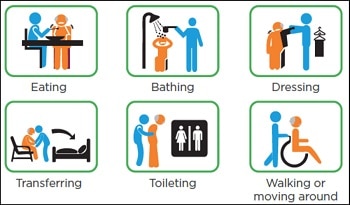
ADL is a popular acronym for “Activities of Daily Living.” This term refers to two specific skill sets generally learned over the course of one’s life, but which may again desert the learner in old age or following a trauma such as a stroke.
What are ADLs/ IADLs?
Two mnemonic devices can help families remember what counts as an Activity of Daily Living. These are DEATH and SHAFT.
DEATH spells out:
Dressing/bathing, Eating, Ambulating (walking), Toileting, Hygiene.
To further break down the categories: Dressing might also include picking out clothes that match and/or are appropriate for the occasion, weather, or environment. Eating might also include safe and healthy food preparation (though food prep is cross-classified as an IADL, below). Ambulating might indicate mobility with or without the use of an assistive device, such as a walker, or the (in)ability to climb stairs. Toileting could include recognizing and responding to the body’s urgency, making it to the bathroom in time, and cleaning up afterward. Hygiene ranges from washing one’s hands to brushing and/or flossing one’s teeth, doing one’s hair, putting on makeup, etc.
Included as a footnote to each of these activities is the understood implication that the individual is able to stand up and sit down and get back up again. DEATH skills are typically learned as a young child and implemented throughout one’s life.
SHAFT spells out:
Shopping, Housekeeping, Accounting, Food preparation/meds, Telephone/transportation.
SHAFT skills comprise what are known as Instrumental Activities of Daily Living (IADLs). They represent a category of skill typically learned during adolescence. Housekeeping refers to house-cleaning as well as associated tasks like laundry. Transportation may include driving skills or the ability to navigate public transit. Though not listed as part of the handy acronym, IADLs also include caring for other people or pets.
How to Measure ADLs
Both types of skills (DEATH and SHAFT) may be measured qualitatively in order to determine an individual’s suitability for independent living. In older adults, particularly those suffering from dementia or early Alzheimer’s, SHAFT skills will fade first, followed by DEATH skills. Of the DEATH skills, bathing tends to be the first to fade. Bathing is therefore the skill most often supported in assisted living facilities. The rest of the ADLs tend to follow in a predictable pattern of decline, with an individual most likely to next need help in dressing him/herself, then toileting, then walking, and finally, eating.
Here’s a checklist that can be a good tool for families attempting to determine whether their loved ones are good candidates for assisted living.
Why Storytelling Helps
Individuals suffering from Dementia or Alzheimer’s may lose their short-term or long-term memories, and even a sense of who they are. These ‘gaps’ usually don’t bother the sick person until they are pointed out, either by family members or medical staff who ask direct questions only to reprimand the person when he/she answers incorrectly. After awhile, memory care patients may quit talking altogether. Talking is a social skill like any other—it must be practiced to be maintained, or it may be lost irrecoverably.
Storytelling is a great alternative to memory-sharing because anyone can make up a story. Shown a random picture and asked to describe “the story” happening in the scene, an individual may draw on either (or both!) memory and imagination to create a lively monologue. In the right environment, storytelling is fun, stress-free, and encourages patients to be more engaged and alert. It also affords an opportunity to practice communication skills without critique, and restores a social role to someone who was once a wife or a banker, but who has no memory of that life any longer.
Socialization, though not by definition an Activity of Daily Living, tops the list in terms of how often and in what ways we interact with others every day. Fostering social skills as often as possible, in a way that is non-threatening, can maintain or perhaps even improve a patient’s ability to perform closely-related DEATH and SHAFT skills easily and for a long time to come.
Jess Hagemann is an award-winning author and accomplished biographer. She owns a ghostwriting service in Austin, Texas called Cider Spoon Stories through which she helps seniors write their life stories.